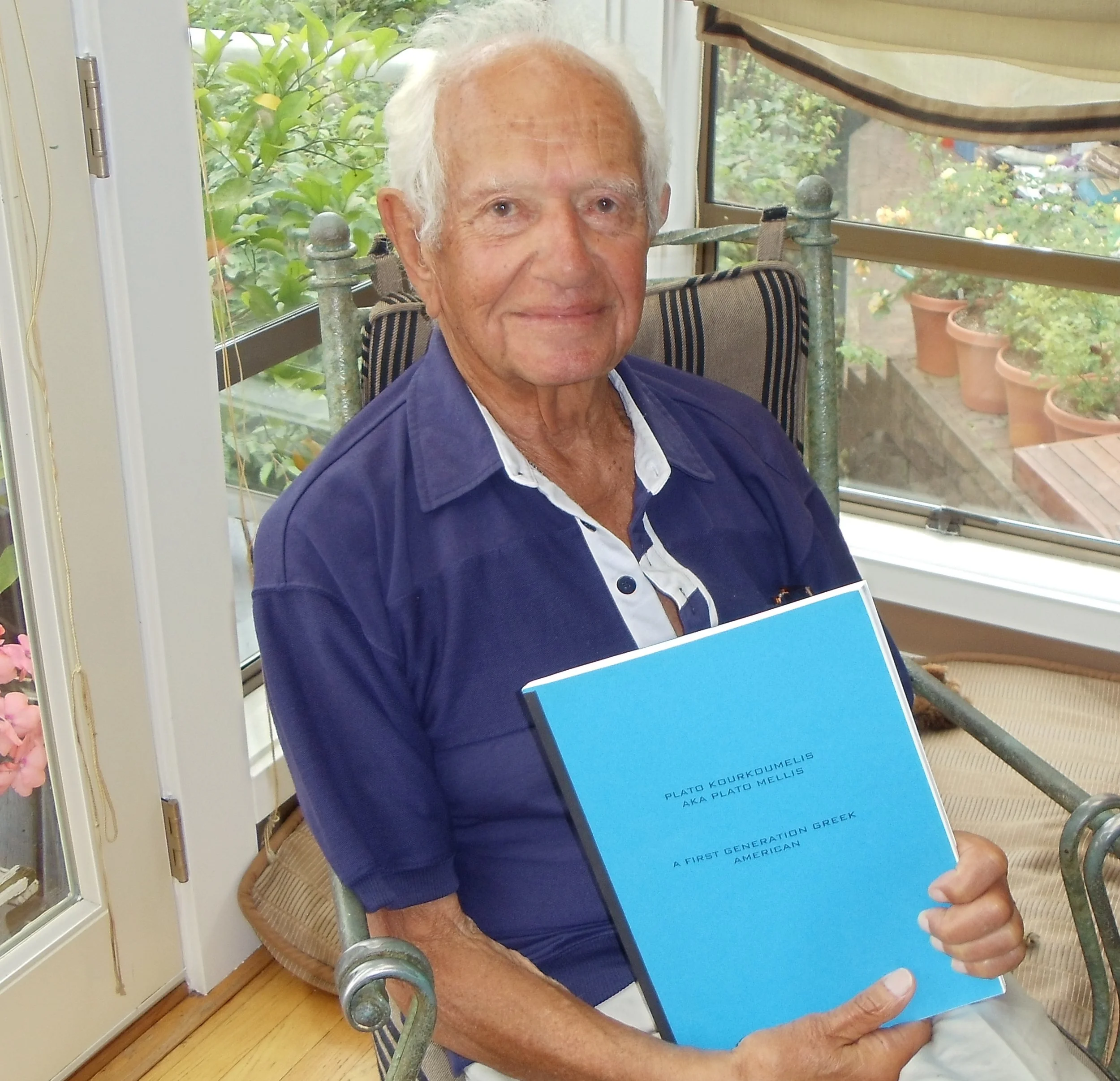A Man of the Sea
What more appropriate title could have been given to this man, Plato Dionysios Kourkoumelis (Mellis)? Throughout his life as an accountant and businessman, his love of the sea has played a major role.
Everyone has a story to tell.
Plato and his book by John Nicon.
Some have taken the time to document their experiences. Plato is one of the latter as evidenced by his book of stories, memories, colorful characters and photos. He wrote A First Generation Greek American “because of my desire to know more about my roots and the history of my ancestors.” He wrote the 90-page book primarily for his grandchildren. It includes not only his own experiences but also the history of the local fishing industry of which his father, his uncle and other relatives and friends were an important part. The book also includes a section written by Plato’s grandson about the family and the fishing industry.
Plato’s parents were from the island of Cephalonia (Kefallonia) off the west coast of Greece in the Ionian Sea. His father Dionysios was born in the village of Skala in 1880. The Kourkoumelis family operated a freight service between the island and Piraeus, the port of Athens. Thus, it was no surprise that boats and the sea were to become the family business in Seattle, Washington. Dionysios came to Seattle in 1906 and worked digging ditches for the phone company until he was able to buy his own boat and begin his fishing business.
When the war between Greece and Turkey began in 1912, Dionysios returned to Greece to defend his homeland. In 1916 on a ship back to America he traveled with an acquaintance, Vangelis Balentis. Balentis had a sister, Kyriakoula, from Faraklata in the mountains of Cephalonia. Dionysios knew of her and paid Vangelis to return to Greece, arrange the marriage and bring Kyriakoula to Seattle. When she arrived, Dionysios said she was too old for him (by three years) but Vangelis threatened to “blow his head off” if he did not marry his sister. The marriage took place in the Russian Orthodox Church in Seattle on September 11, 1916. They had a lifetime of a very amicable and caring relationship.
Dionysios and Kyriakoula Kourkoumelis, circa 1940
Plato was born on December 30, 1919. He was supposed to be named after his maternal grandfather but his godfather didn’t like the traditional name and gave him Plato instead. The family lived in a boat house community on the west side of the Duwamish River in West Seattle where almost all Greek fishermen lived. Fishing boats were tied along the side of the boat houses. Dionysios almost never came to dinner by himself but would often bring his crew members. There was always plenty to eat, especially fish.
Growing up in West Seattle
Kourkoumelis children, circa 1923: Dionysia, Gerasimos, Plato and Jimmy (front)
At the age of six, Plato and his siblings Gerasimos, Dionysia and Jimmy moved with their parents to the Youngstown neighborhood of West Seattle. Plato’s memories of the several families and bachelors that lived along the river and in West Seattle are vivid. Family names included Spencer, Kotinas, Fotos, Cayafas, Begleris, Pahis, Dunis, Kabitchis and Poriotes.
Family, circa 1927: Dionysia, Gerasimos, Kyriakoula, Jimmy (front), Dionysios, Eleni (sitting), Plato
Plato attended Youngstown Grade School (now Cooper Elementary) and West Seattle High School. After some work experience in the grocery business he studied accounting at what was then Broadway Community College, also in Seattle, and began working for IBM in 1939. When World War II broke out and punch card accounting began, he helped set up accounting and payroll systems for the Associated Ship Builders in Seattle.
The Call of the Sea
Plato, circa 1960
The call of the sea then drew Plato into the Merchant Marines for his military service. He completed officer training school and with his accounting background he qualified to serve as a purser. He also received training as a medic. He recalls the cook on one ship coming to him with a bad cut over his eye. Plato, with some reservations, successfully sewed up the cut. As a thank you, he received fresh bread regularly. Plato served until a year after World War II ended. At that time Congress passed legislation awarding Merchant Mariners veteran status and Plato was honorably discharged from the U.S. Navy and the U.S. Coast Guard.
Plato returned to IBM and worked there until its relationship with a major client, National Grocers, ended. He then began his own accounting business but set it aside when contacted by Moore Business Forms Company. For the next 37 years he managed business forms sales in the Northwest. He retired in 1985 as Northwest Manager for the computer division and Seattle Sales Manager which included territory from Olympia, Washington, north into British Columbia, Canada.
With four children from his marriage to Angelina Mulenos he now has seven grandchildren.
A Part of the Greek Community
Plato in his element
For his involvement in the Greek community, Plato is proud of having served on the parish council when Seattle’s St. Demetrios Greek Orthodox Church built its new facility in 1962. He attended Greek school in Seattle and most of his early friendships were among Greeks. When asked if he felt he was treated differently or unfairly as a Greek man he recalls that discrimination existed against southern Europeans in private golf clubs in Seattle but never felt he was impacted directly.
In his retirement Plato still spends much time at sea enjoying the life he treasures. In the summer he is often away from home for long periods on his son’s boat. At 91 he says, “Enjoy life while you can.” And though he says, “I don’t care,” Plato will be remembered as a very fair person in all his business dealings. Thinking of him at sea, smoking his cigars and drinking scotch whiskey, brings smiles to the faces of family and friends.
By John and Joann Nicon, August 2011
Sources
Photos from Kourkoumelis family collection unless otherwise noted.
Video interview by John and Joann Nicon, August 2011
A First Generation American by Plato Kourkoumelis, aka Plato Mellis; A History of Saint Demetrios Greek Orthodox Church and Her People, p 201-202







